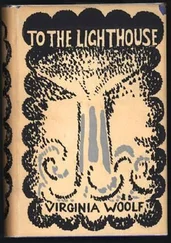“I’ve taken a room over there,” he said.
“You’re not going?” she exclaimed.
“On the whole—yes,” he remarked. “No private cook can cook vegetables.”
Knowing his dislike of questions, which she to some extent shared, Helen asked no more. Still, an uneasy suspicion lurked in her mind that William was hiding a wound. She flushed to think that her words, or her husband’s, or Rachel’s had penetrated and stung. She was half-moved to cry, “Stop, William; explain!” and would have returned to the subject at luncheon if William had not shown himself inscrutable and chill, lifting fragments of salad on the point of his fork, with the gesture of a man pronging seaweed, detecting gravel, suspecting germs.
“If you all die of typhoid I won’t be responsible!” he snapped.
“If you die of dulness, neither will I,” Helen echoed in her heart.
She reflected that she had never yet asked him whether he had been in love. They had got further and further from that subject instead of drawing nearer to it, and she could not help feeling it a relief when William Pepper, with all his knowledge, his microscope, his notebooks, his genuine kindliness and good sense, but a certain dryness of soul, took his departure. Also she could not help feeling it sad that friendships should end thus, although in this case to have the room empty was something of a comfort, and she tried to console herself with the reflection that one never knows how far other people feel the things they might be supposed to feel.
Table of Contents
The next few months passed away, as many years can pass away, without definite events, and yet, if suddenly disturbed, it would be seen that such months or years had a character unlike others. The three months which had passed had brought them to the beginning of March. The climate had kept its promise, and the change of season from winter to spring had made very little difference, so that Helen, who was sitting in the drawing-room with a pen in her hand, could keep the windows open though a great fire of logs burnt on one side of her. Below, the sea was still blue and the roofs still brown and white, though the day was fading rapidly. It was dusk in the room, which, large and empty at all times, now appeared larger and emptier than usual. Her own figure, as she sat writing with a pad on her knee, shared the general effect of size and lack of detail, for the flames which ran along the branches, suddenly devouring little green tufts, burnt intermittently and sent irregular illuminations across her face and the plaster walls. There were no pictures on the walls but here and there boughs laden with heavy-petalled flowers spread widely against them. Of the books fallen on the bare floor and heaped upon the large table, it was only possible in this light to trace the outline.
Mrs. Ambrose was writing a very long letter. Beginning “Dear Bernard,” it went on to describe what had been happening in the Villa San Gervasio during the past three months, as, for instance, that they had had the British Consul to dinner, and had been taken over a Spanish man-of-war, and had seen a great many processions and religious festivals, which were so beautiful that Mrs. Ambrose couldn’t conceive why, if people must have a religion, they didn’t all become Roman Catholics. They had made several expeditions though none of any length. It was worth coming if only for the sake of the flowering trees which grew wild quite near the house, and the amazing colours of sea and earth. The earth, instead of being brown, was red, purple, green. “You won’t believe me,” she added, “there is no colour like it in England.” She adopted, indeed, a condescending tone towards that poor island, which was now advancing chilly crocuses and nipped violets in nooks, in copses, in cosy corners, tended by rosy old gardeners in mufflers, who were always touching their hats and bobbing obsequiously. She went on to deride the islanders themselves. Rumours of London all in a ferment over a General Election had reached them even out here. “It seems incredible,” she went on, “that people should care whether Asquith is in or Austen Chamberlin out, and while you scream yourselves hoarse about politics you let the only people who are trying for something good starve or simply laugh at them. When have you ever encouraged a living artist? Or bought his best work? Why are you all so ugly and so servile? Here the servants are human beings. They talk to one as if they were equals. As far as I can tell there are no aristocrats.”
Perhaps it was the mention of aristocrats that reminded her of Richard Dalloway and Rachel, for she ran on with the same penful to describe her niece.
“It’s an odd fate that has put me in charge of a girl,” she wrote, “considering that I have never got on well with women, or had much to do with them. However, I must retract some of the things that I have said against them. If they were properly educated I don’t see why they shouldn’t be much the same as men—as satisfactory I mean; though, of course, very different. The question is, how should one educate them. The present method seems to me abominable. This girl, though twenty-four, had never heard that men desired women, and, until I explained it, did not know how children were born. Her ignorance upon other matters as important” (here Mrs. Ambrose’s letter may not be quoted) … “was complete. It seems to me not merely foolish but criminal to bring people up like that. Let alone the suffering to them, it explains why women are what they are—the wonder is they’re no worse. I have taken it upon myself to enlighten her, and now, though still a good deal prejudiced and liable to exaggerate, she is more or less a reasonable human being. Keeping them ignorant, of course, defeats its own object, and when they begin to understand they take it all much too seriously. My brother-in-law really deserved a catastrophe—which he won’t get. I now pray for a young man to come to my help; some one, I mean, who would talk to her openly, and prove how absurd most of her ideas about life are. Unluckily such men seem almost as rare as the women. The English colony certainly doesn’t provide one; artists, merchants, cultivated people—they are stupid, conventional, and flirtatious….” She ceased, and with her pen in her hand sat looking into the fire, making the logs into caves and mountains, for it had grown too dark to go on writing. Moreover, the house began to stir as the hour of dinner approached; she could hear the plates being chinked in the dining-room next door, and Chailey instructing the Spanish girl where to put things down in vigorous English. The bell rang; she rose, met Ridley and Rachel outside, and they all went in to dinner.
Three months had made but little difference in the appearance either of Ridley or Rachel; yet a keen observer might have thought that the girl was more definite and self-confident in her manner than before. Her skin was brown, her eyes certainly brighter, and she attended to what was said as though she might be going to contradict it. The meal began with the comfortable silence of people who are quite at their ease together. Then Ridley, leaning on his elbow and looking out of the window, observed that it was a lovely night.
“Yes,” said Helen. She added, “The season’s begun,” looking at the lights beneath them. She asked Maria in Spanish whether the hotel was not filling up with visitors. Maria informed her with pride that there would come a time when it was positively difficult to buy eggs—the shopkeepers would not mind what prices they asked; they would get them, at any rate, from the English.
“That’s an English steamer in the bay,” said Rachel, looking at a triangle of lights below. “She came in early this morning.”
Читать дальше












